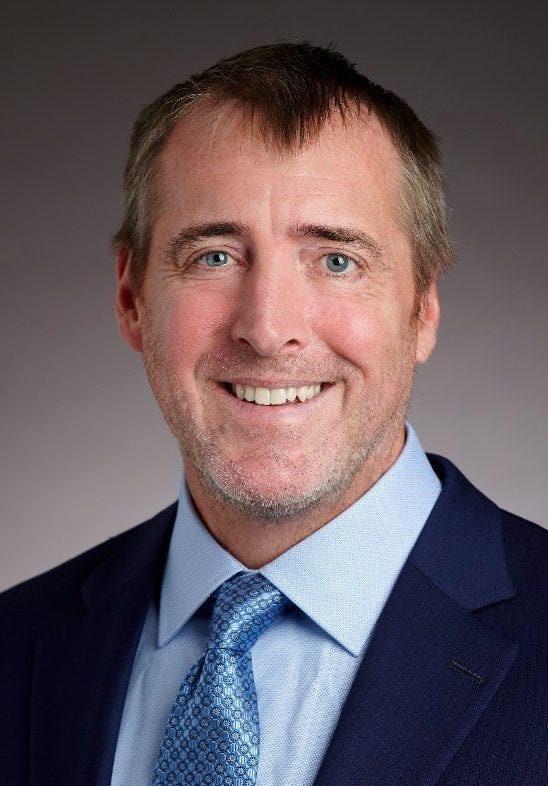20-year-old Renodis has expanded to where most telecom agents would never go.

Minnesota channel partner Renodis is using M&A to ramp up its competencies in 5G, hospitality and utilities, among other growth areas.
The St. Paul-based telecom and mobility management provider wrapped its fifth acquisition last week in the form of Eric Ryan Corporation. The 20-year-old company’s inorganic growth strategy first started in 2018 but has ramped up in 2022. The agency is planning to announce two more deals by the end of the year.

Renodis’ Craig Beason
“We don’t want to grow faster than we can handle,” Renodis CEO Craig Beason told Channel Futures. “We’ve got our eyes set on getting over $100 million dollars in top line revenue with a healthy EBITA to the bottom, and I think we have a good plan,”
Background
Beason founded the agency in 2002. At the time he held no telecom experience, other than working in a carrier’s HR division. Nevertheless, Beason said he saw an opportunity to build a telecom service model. As he saw it, business customers would benefit from someone managing their POTS lines from install to end-of-life.
Twenty years ago telecom centered around frame relay, before MPLS came into the picture.
“Telecom’s not a sexy space for enterprise clients. It’s kind of a means to the ends – the janitorial component. I felt at the time that there was a message around building and managing the lifestyle stack of the services,” Beason said. “I felt like enterprises didn’t do a great job with it. Carriers didn’t do a good job supporting it. I thought that the enterprise market would pay to have an expert come in to manage the life cycle, as well as the advisory services that go with that.”
Life Cycle Management
More and more agents brand themselves as holistic providers of technology services. That means expanding beyond vendor sourcing to walking the client through the entire life of the technology. Beason said Renodis was one of the first firms to take this approach.
“I’ve always said that this is where it’s going to go. The customers and the carriers are going to require agents to do more than brokering the services. There’s a lot of value in brokering the services. But unfortunately, as the market and the climate get that much more competitive, you’ve got to be able to offer more value-added services around it,” he said.
However, building such a practice doesn’t occur overnight, Beason said.
“I can build a website overnight and say I do it, but it’s a lot more involved than just working off a spreadsheet. If you’re doing a small client and bill $50,000 a month, maybe you could pull it off. But when you get to the enterprise, they’re looking for just a different level of tool sets and products,” he said.
Beason and his team built the practice from the ground up. He was a newly married young man when he started Renodis. His pregnant wife had recently taken voluntary severance. Cash was scarce. Growth came slowly but surely.
“Every year, every extra dollar went right back into building out products, tools and hiring people to be able to slowly morph into that outsourced model,” he said.
Beason said Renodis spent 2009 to 2013 building its in-house technology to enable itself to fully manage telecom. At the end of that stretch, a CIO approached them about the offering. The CIO wanted to help Renodis make the platform “enterprise-ready.” Moreover, they wanted to become…… Renodis’ first client for the service.
“We spent 16-18 months building it, breaking it, rebuilding it again. And when it was ready, the CIO did exactly what he said,” Beason said. “We kind of rode that wave for a while for two to three years with nice organic growth because of that.”
Inorganic Growth
The team eventually set its sights on a new way to scale. An agency approached them in 2018 about an acquisition. The firm had been looking for a way to exit the business while taking care of their customers and employees. Renodis purchased the company, and afterwards Beason’s chief financial officer suggested that the deal might exemplify future opportunities.
“It seems like there’s a lot of partners out there that might be looking for a similar exit. We’ve invested a lot of money in who we are. We’ve overbuilt our management team to grow. We can be a $100 million company, but organic growth gets you there slower,” Beason recalled the CFO saying.
So Renodis put together a plan for M&A, leveraging his own cash and traditional bank financing. The firm narrowed its targets down to a final selection and began putting pen to paper.
Then March 2020 hit.
Beason said he was literally sitting in the conference room of another company getting ready to sign an agreement when he realized he needed to take the pandemic into consideration. The team decided to regroup and make revaluate the health of their business.
As it turned out, the business was even healthier than they thought. Beason said May, June and July of 2020 drove record-setting numbers. The shift to remote work drove higher demand for Renodis’ services. That included setting up cellphones, soft phones and increasing bandwidth size.
“A lot of it was support wrapped around this huge base of home users that used to go into the office and had all the technology sitting there at their fingertips,” Beason said.
RCN, RTech and the 5G opportunity
Renodis in March 2022 announced that it had acquired stakes in RCN Technologies and RTech Solutions. RCN provides 5G and LTE consulting and integration. RTech bundles LTE and 5G solutions, which include cross-carrier pooled data.
Beason said the deals, which represented Renodis’ third and fourth acquisitions, helped position the company as a leading 5G LTE enablement partner.
“I believe that 5G is going to replace coax sooner rather than later,” Beason told Channel Futures. “I think it’s going to be a very sought-after technology. They’ve got nine years of doing nothing but data, so they really understand that world. I think it’s going to be an evolution that happens like everything else that we’ve seen over the last 20 years.”
Moreover, Beason said the consumption model of RCN’s 5G offering closely mirrors that of a traditional telecom agent……
“It’s just an entirely different channel and quite honestly, a lot more sexy from a product operating standpoint, because of where 5G is going, versus where your traditional circuits are going,” he said.
Private 5G and the Partner
Beason said 5G presents a particularly large opportunity in the area of private and public campus networks. Renodis has started testing out solutions with some hefty campuses, he said. Many of those clients run deep R&D that involves many IoT devices. The private 5G campus environment lets them flexibly access the bandwidth they need.
Private 5G networks generated plenty of headlines in the enterprise computing world. However, in many cases the Verizons and AT&Ts of the world are landing those customers through direct deals or through a large systems integrator. Agents often lack the required familiarity with hardware providers like Cradlepoint that enable these networks. Moreover, many agents don’t want to dive into a space where recurring commissions aren’t the norm.
But the RCN and RTech acquisitions change that for Renodis, Beason said. He said that legacy VARs have struggled to sell telco, while agents don’t have the hardware. The acquisition represents an inevitable convergence between those two, he said. And convergence might play out most clearly in the wireless arena.
“We understand the Verizon, T-Mobile and AT&T 5G piece. The hardware component is somewhat foreign to us, but it’s not foreign to RCN. So we got the expertise overnight by doing the transaction,” Beason said.
New Opportunities with ERC
Most recently Renodis acquired 32-year-old Eric Ryan Corporation. The company functions as the fourth largest employer in the town of Ellwood City, Pennsylvania. Beason described the employees as “good, seasoned, tenured and hardworking,” and an indication of good culture.
Beason also said ERC brought multiple new angles to the table for Renodis. On one hand, ERC had developed a strong base of hospitality customers.
“Out of my 900 clients, I’ve got one hospitality client. So it really gets us into hospitality in a big way. Hospitality clients have a little different needs than enterprise, but they’re extremely good clients,” he said.
ERC also has been been helping customers save money in the areas of utilities and energy, in addition to telecom. And that utility component resonated strongly with Beason.
“That utilities piece, albeit a little bit more restrictive from an offering standpoint than we’re used to on the telecom side, delivers a tremendous amount of value to clients with getting energy at a better price. These are all things that we understand on the telecom side,” he said.
Telarus at its latest summit brought ERC’s chief operating officer Rebecca Hink on stage to honor the company for its investment in its agency practice. While ERC had historically provided telecom expense management, it had stayed away from sourcing. Hink advocated strongly within the team to add the advisory services about 10 years ago.
“She was 100% right. It really drove a lot more value to clients,” Beason said.
In addition, the acquisition benefits Eric Ryan by bringing in Renodis’ operational abilities.
“We’ve invested heavily in that. We think day one we’re going to be able to enable their business to drive to the same efficiencies that that we’ve had the fortune to do at Renodis,” Beason said.
Looking Back, Looking Ahead
Beason said Renodis’ vision has remained the same in its 20 years. But growing the business proved a constant challenge to live in the moment.
“There’s no education you can get to do this,” Beason said. “I treated every day like it was a brand new slate. Yeah, yesterday might have been a bad day, but today is a new slate and a different day. Keep walking up the mountain one foot after the next.”
Want to contact the author directly about this story? Have ideas for a follow-up article? Email James Anderson or connect with him on LinkedIn. |
About the Author(s)
You May Also Like


